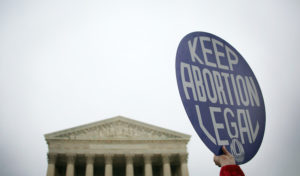
The Supreme Court overturns Roe v. Wade, limits EPA’s ability to combat climate change, and more…
IN THE NEWS
- The U.S. Supreme Court, in a 6-3 decision, overturned Roe v. Wade, the landmark 1973 decision recognizing a constitutional right to abortion before fetal viability. The Court upheld a Mississippi law that bans abortion after 15 weeks of pregnancy and restored states’ ability to ban abortions. The majority stated that its decision would not affect other constitutional rights that do not concern abortion. Justice Thomas, however, argued in his concurrence that the Court should reconsider longstanding substantive due process rulings, including Griswold v. Connecticut, which established the right for married couples to obtain contraception, and Obergefell v. Hodges, which protects the right to same-sex marriage. Although about half of the states have already banned abortions or have laws in place that could quickly ban or severely restrict abortions in the future, other states are expanding protections. California Governor Gavin Newsom, for example, signed a bill protecting abortion recipients and providers in California from lawsuits from other states that outlaw abortion or that may make it illegal for a person to travel to California to receive an abortion.
- The Supreme Court, in another 6-3 decision, ruled that the U.S. Environmental Protection Agency (EPA) does not have the power—absent an express authorization from Congress— to set emissions caps for power plants in a way that would drastically alter the U.S. energy system. The Court held that Congress, in the Clean Air Act, did not grant EPA the authority to make “decisions of vast economic and political significance” in regulating carbon emissions. In a ruling based on the major questions doctrine, the Court concluded that EPA needed to have “clear congressional authorization” to make such regulations. The Court’s ruling significantly narrows EPA’s climate-related regulatory power and restricts the Biden Administration’s ability to mitigate the effects of climate change. Justice Kagan, in her dissent, stated that the Court’s majority, with its decision, “appoints itself—instead of Congress or the expert agency—the decision-maker on climate policy.”
- President Joseph R. Biden signed into law The Bipartisan Safer Communities Act, the first major U.S. gun legislation in nearly 30 years. This new federal law encourages states to pass red flag laws, which allow officials to confiscate guns temporarily from people deemed dangerous by a court to themselves or others. The law also enhances background checks for people under the age of 21, closes a loophole that has allowed abusive romantic partners to purchase firearms, and criminalizes “straw purchases,” in which an individual purchases a gun on behalf of someone who is not permitted to purchase one themselves. President Biden called the law a “compromise,” stating that “when it seems impossible to get anything done in Washington, we are doing something consequential.”
- The Supreme Court ruled that a former Washington public school football coach has a constitutional right to pray on the field after games. The court held that the Free Exercise and Free Speech Clauses of the First Amendment protect the coach’s ability to pray publicly on the field. The majority, in its decision, rejected the school district’s concerns that the coach’s prayers could be seen as coercive to students or as a government endorsement of a particular religion. Justice Sotomayor, joined by two others in dissent, argued that the majority’s holding harms the “nation’s longstanding commitment to the separation of church and state.” The Court’s ruling follows several Supreme Court opinions this term that have expanded religious freedoms.
- The Supreme Court, in another case, upheld the Biden Administration’s recission of the Trump Administration’s Migrant Protection Protocols—otherwise known as the “Remain in Mexico” policy—which required certain non-Mexican asylum-seekers who arrive in the United States from Mexico to return to Mexico while awaiting a decision. The Court reasoned that the underlying Immigration and Nationality Act provides discretionary power to create the protocol, not a mandate. Justice Alito dissented, arguing that a lack of detention centers in the United States necessitated the Migrant Protection Protocols under federal law. Justice Barrett also dissented, recommending the lower courts reconsider the case in light of a recent decision of the Court which examined whether lower courts have the power to “enjoin or restrain” provisions of federal immigration law.
- The U.S. Court of Appeals for the D.C. Circuit temporarily blocked a U.S. Food and Drug Administration (FDA) order that banned an e-cigarette manufacturer Juul from selling e-cigarettes in the United States. In its order, FDA cited concerns about the potential toxicity of Juul’s e-cigarettes. In granting Juul’s motion to block FDA’s order temporarily, the court explained that it needed more time to review the case and that the stay “should not be construed in any way as a ruling on the merits of that motion.”
- The Supreme Court, in a 5-4 decision, held that states cannot raise sovereign immunity as a defense to block veterans from bringing lawsuits under the Uniformed Services Employment and Reemployment Rights Act—which requires states and employers to rehire returning veterans. A disabled service member who was also a former state trooper brought the suit after the Texas Department of Public Safety failed to make reasonable efforts to accommodate his disability by offering an equivalent position. The Court reasoned that states surrender some sovereignty to Congress’s constitutional authority to raise and support armies. Justice Thomas dissented, arguing that Congress exceeded its power by allowing veterans to sue nonconsenting states under the Act.
- The U.S. Department of Transportation’s Maritime Administration designated offshore wind installation ships as “vessels of national interest,” eligible for financing from the U.S. government. The Transportation Department’s designation allows offshore wind builders to obtain specialized installation ships under favorable long-term repayment terms at lower interest rates than terms from commercial lenders. Deputy Transportation Secretary Polly Trottenberg explained that the designation aims to encourage “a robust U.S. offshore wind industry to help bring costs down for American families and build a clean energy future.”
WHAT WE’RE READING THIS WEEK
- In a forthcoming Yale Law Journal Forum article, Carleen M. Zubrzycki, an associate professor at University of Connecticut Law School, examined state privacy laws that are currently being passed to protect the medical records of women seeking out-of-state abortions. Zubrzycki argued that, although the legislators adopting these state laws intend to facilitate medical safe-havens, they overlook federal regulations that allow, or even require, health care providers to share patient information with other physicians. Zubrzycki cautioned that information-sharing requirements may affect patients’ ability to obtain other state-criminalized medical treatments out-of-state, such as gender-affirming surgeries.
- In a new study, David Hoffman, a professor at University of Pennsylvania Carey Law School, and Anton Strezhnev, an assistant professor at The University of Chicago, found that Philadelphia tenants who live farther from courthouses are less likely to show up to court, often leading to eviction by default. Hoffman and Strezhnev discovered that, between 2005 and 2021, nearly 40 percent of tenants were evicted because they did not appear to contest their cases. Hoffman and Strezhnev estimated that for every additional 10 minutes in commuting times, Philadelphians were between 0.65 and 1.4 times more likely to default on their rent and that if all tenants had an equal commuting time of 10 minutes, there would have been between 4,163 and 9,234 fewer evictions. Hoffman and Strezhnev suggested that virtual courts, easier rescheduling opportunities, and improved mass transit systems would increase access to eviction hearings for many people.
- In a Brookings Institution report, Sanjay Patnaik, director of the Center on Regulation and Markets, and Kelly Kennedy, senior research assistant with the Center on Regulation and Markets, urged the federal government to establish a price on carbon to reduce U.S. carbon emissions. Patnaik and Kennedy explained that imposing a price on carbon encourages companies to lower their greenhouse gas emissions. Patnaik and Kennedy proposed that the United States adopt either a carbon tax or a cap-and-trade system requiring companies to purchase a permit for each ton of carbon they emit. Patnaik and Kennedy argued that these measures would mitigate the impact of climate change, uphold the United States’ reputation as a leader on climate issues, and boost the global competitiveness of U.S. businesses.
EDITOR’S CHOICE
In a 2021 essay in The Regulatory Review, Amal Bass, director of policy and advocacy at Women’s Law Project, highlighted the importance of passing state and federal legislation to codify protections for LGBTQ+ individuals. Bass warned that the Supreme Court could overturn Bostock v. Clayton County, the case establishing that Title VII of the Civil Rights Act extends to LGBTQ+ employees. In turn, Bass endorsed passage of both the Pennsylvania Fairness Act, which would prohibit discrimination on the basis of sexual orientation, and the Equality Act, which would add sexual orientation and gender identity to existing federal civil rights law.



